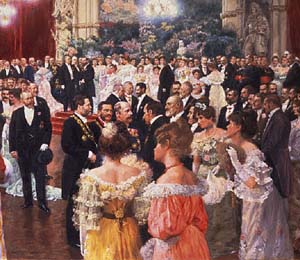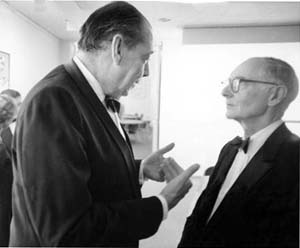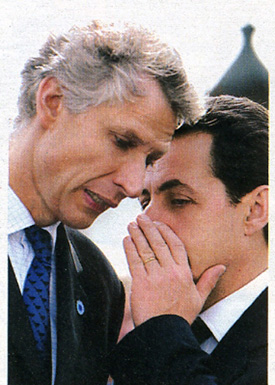 |
Formation of Children
The Voice – Speaking and Conversing
Marian T. Horvat, Ph.D.
One of the great modern myths regarding conversation is that we are entitled to “speak our mind,” that is, to express our hidden thoughts or just say whatever comes into the head at the moment. This is simply wrong. Both spontaneous actions were always condemned as inappropriate in countries under the good influence of Catholic Civilization. You will see an example of this in the careful instructions to Catholic young men given in Chapter 10 of the Small Manual of Civility on the art of conversation.
Don’t just speak, but think before you speak: that is the first general rule. A gentleman or lady never uses words to harm or demean another person. Being kind and courteous is more important than being considered quick and clever.
Second, we should be conscious of how we speak: the tone of voice and attitude it projects, correct diction and grammar, and so on. Parents and educators should correct a young man with a whining voice or soft feminine tonus. Let the voice, like a man’s stance and actions, reflect a strong, firm manly nature.
Often, having strong convictions gives one the notion that he has the right and responsibility to inflict his thinking on everyone he speaks to. He ceases to engage in conversation; he gives lectures. Instead of inviting his neighbor to good positions, he ends by alienating them. A person who knows how to express himself well, using the correct tone and carefully choosing his words, will exert a natural influence over others, influence that can be used for the good. His family and friends will seek him out to know his opinions and receive advice, instead of avoiding him for fear of receiving a new harangue.
At the end of this chapter there is a list of rules of conversation. I would suggest that each one read them carefully and try to apply them. I think there will be very few who do not find several points to check off that could use some work or polish.
Here is my edited translation of Chapter 10.

The Conversation by Rembrandt |
There is nothing more beautiful than the human voice. The word being the principal means that we possess to express our thought and to communicate with our neighbors, it is invested with qualities most useful to know.
The voice fulfils a very difficult and at the same time marvelous role in our relations with others: it transmits our thinking and manifests the private workings of our conscience, to the degree we desire.
In effect, there is nothing as hidden, impenetrable and inviolable as a human thought. Even if the brain of a great thinker could be split open, or his cranium become transparent like the purest crystal, we could not discover a single thought in it. With all the modern means of communication today, we can know what is happening in every corner of the world; however we do not know what the man sitting next to us is thinking unless he chooses to express what he is thinking. The same is true of the conscience –an inviolable private place whose key to know it is in the hands of each man alone. This key is the word.
The word is silver and silence is golden
The word is the sensible expression of the invisible thought. It does not know the hindrance of borders and territorial limits. Customs workers can prevent the entrance of drugs and arms; but who can detain passage of the word? The word spoken by the apostle of God or by the anarchist has the power to spread the seed of good or evil through entire regions. Since the word is one of the things to be most feared in this world, its usage should be regulated by very severe laws.
The Book of Wisdom says that one who does not sin by the tongue is a perfect man. Sometime we hear persons who have spoken hastily or wrongly trying to excuse themselves: “It’s nothing – just a word in the air, said without thinking.” This is not true. Words are like money; and we all know that no one throws money in the air, or out the window.
The tone of voice

By his effort Demosthenes corrected his defects |
In the whole human genre, there are not two voices with the exact same timbre and resonance. One man, for example, may have a delicate, smooth voice with an elegant tone; he received from nature an inestimable gift, because a word of consolation offered by a harmonious, lithe voice can move and conquer the anguished soul. It brings a ray of light, and hope penetrates the heart pierced by the tragedies of human existence. One should zealously conserve the treasure of such a voice.
But if a boy has a voice that is too soft, he should practice exercises to make it stronger. Remember the great Greek orator Demosthenes who corrected his soft tone, strengthening his voice by speaking on the seashore over the roar of the waves
If the voice has a hard, sharp sound, one should try to develop a more cordial tone by means of practice or voice lessons.
It is necessary to discipline the voice, to correct bad habits of pronunciation with the same rigor that one corrects perverse actions of the body. In elementary schools, teachers should instruct the children to pronounce words clearly and speak with composure, destroying early the defects and bad habits that could later become disagreeable in conversation or in public speaking. One should try to correct the defects of regional accents, especially if it is hillbilly or unclear, and try to acquire in speaking the same discipline demanded in walking and acting: that is, we should have a clear, unaffected and firm way of speaking.
We should try to eradicate from our voices what could cause our neighbor to make a lesser judgment about us: the dry or acrid tone, the impertinent inflections, the arrogant tenor, the irritating whine.
Tones to be corrected
The strident or impertinent voice pounds listeners, offending their sense of dignity and worth. It injures our relations with others, predisposing them to argument and discord. One should combat this acridity by trying to develop a tone that is smoother, more polished, deferential and amiable.
These tones should also be avoided
- The biting tone that leaves behind hurt feelings;
- The tart tone that seems to want to quarrel;
- The ironic tone that destroys peace and harmony because it humiliates our neighbor;
- The critical tone that has the aim of showing one’s rare wisdom, but rather serves to raise the antipathy and scorn of others;
- The affected, overly-refined tone, an expression of vanity;
- The soft languid tone of the lazy man, indicating a soul without energy or a character lacking sound principles.
Conversation
One of the most pleasant forms of using words is the good, simple conversation.

A conversation can be polished and brilliant, above, a Vienese ball; or simple and honest, below, some sailors enjoying each other's company

Conversation in the Hold by John Morgan |
To converse is to exchange ideas, sentiments and impressions between two or more persons. For man, to converse is a necessity – a greater or lesser need depending on his degree of culture and civilization – because it is to establish between minds an elevated relationship that allows an exchange of ideas, teachings, convictions and opinions about the truth, society and practical matters.
But in conversation, as in business, there are thieves; these thieves are those who rob the conversation of its good fruits by using evil language. We should not lend our ears to them, and we should not allow our names to enter this infamous list of foul-mouthed persons. If all men would turn away from these indecorous people, there would be much less calumny, backbiting and vicious gossip on this earth.
Good, cordial conversations often number among the most enjoyable and precious moments in the life of a man. When minds share the same desire of common good, to converse is to fraternize, to relieve one another from the heavy weights of life, to instruct one another by sharing the cathedral of knowledge and rich experience that another man can possess. It can truly be a banquet of minds.
Good conversation in the bosom of the family is a certain sign of domestic happiness. On the contrary, where it does not exist, we can say that the customs have fallen into decay and the family is heading toward ruin. In a house of well-bred persons, good conversation should turn around elevated themes such as religion, art, culture, and general politics. Personal criticisms should be avoided at all costs, as well as business matters and prosaic concerns about one’s health. In a general conversation, all the members should make an effort to deal with elevated subjects. Doing this, each one should try to speak in the right way at the right time, observing the essential rules of charity and benevolence. In this way we offer our neighbor some of our spirit of fraternity.
Rules of conversation
The rules of good conversation are many:
1. One should not say bad things about those who are present or even those who are absent. If someone ridicules another person, we should take up his defense with calmness and moderation, or keep a profound silence that marks our disapproval.
2. One should not overtly praise the physical, intellectual or moral qualities of the persons present. Such eulogies lack delicacy, can embarrass the modesty of the person whose praises are being sung, and can plant a seed of antipathy and scorn in the listeners for the too-vocal admirer.
3. One should not make a criticism of a defect before knowing that no one in the company suffers from the same defect.

A firm, but not overbearing manner |
4. It is bad taste to speak of one’s own imperfections, because generally they appear without the need to be pointed out. Telling stories where “I” is directly at the center of the episode is not recommended among polite persons.
5. If one of those present makes a scientific, historical, religious, or social mistake, the listeners should maintain an impassive air, letting him finish his exposition. But, after the speaker has presented the erroneous fact, one can speak and express his own differing opinion, entering into the matter with a delicacy of terms that does not speak of self-love or hurt the feeling of the other. The speaker who made the mistake, warned by such amenable words, normally does not become irritated by the correction or angry with the one making it.
6. Do not interrupt the one who is speaking or monopolize the conversation, rambling on about yourself, your family, or personal matters that are of no concern or perhaps even disagreeable to others. Also, one should remember the good advice of Lord Chesterfield: “When conversing, never take hold of a man’s arm, hand, or jacket to oblige him to hear you. It is better to hold a man with your tongue than by his person.”
7. One who listens attentively stimulates the speaker. If the conversation seems fastidious or prolix, one should not express his lack of interest or concern.
8. If you are narrating an episode, avoid repetitious or useless details. Also avoid the constant use of certain words whose repetition makes the conversation bothersome or heavy for the listeners.
9. Do not enter into matters regarding private family affairs, or speak of your professional capability or the titles you have won. Wait until someone manifests the desire to know them. Then, respond with modesty and brevity.

Don't speak aside to another... |
10. Do not let the conversation fall into topics that your guests cannot understand or follow. An equally serious fault would be to whisper or speak in a low voice to someone in the company so that the others cannot hear what you are saying.
11. Avoid spattering the conversation with too many adjectives, reverberant adverbs, or banal phrases, such as, “It was a very, very nice day,” “How perfectly wonderful!,” “It was so obviously clear,”
12. Avoid finishing your statements with the tactless: “do you understand?” Rather, if you truly have a question about whether you were well understood, you should ask: “Was I clear?” This avoids insinuating that your friend is not clever. It is a more modest approach that makes the blame of a possible lack of understanding fall over you. Also avoid ending or interspersing statements with inane and meaningless phrases such as “Right?” “You know?” “Got it?”
13. One should not alter his countenance or make theatrical displays when communicating episodes that can arouse extreme admiration, sorrow or pleasure. The man who dominates his temperament does not exaggerate his expressions of joy or sadness.
14. Know how to conduct yourself if others express opinions different from your own. To end the exchange of ideas with neither a vanquisher nor a vanquished, it is necessary to close the discussion amiably, saying something pleasant, such as: “We may disagree on this topic, but that won’t stop us from enjoying our fishing trip tomorrow.”
15. Every fault against grammar is also a fault against good taste and good breeding. Therefore, use the proper case and agreement, avoid slang and solecisms, as well as foul or vulgar language. Also, do not replace “Yes” and “No” with “Yeah” or “Nope.”.

Posted March 29, 2007


Related Topics of Interest
 The Art of Governing the Hands and Feet The Art of Governing the Hands and Feet
 The Importance of the Greeting The Importance of the Greeting
 The Smile, The Laugh, The Grimace The Smile, The Laugh, The Grimace
 Cleanliness and Good Hygiene Cleanliness and Good Hygiene
 The Eyes and the Gaze The Eyes and the Gaze
 Order in the Professional Life Order in the Professional Life
 Order and the Spirit of Order Order and the Spirit of Order
 How to Sit, Stand, Walk How to Sit, Stand, Walk
 Bearing Bearing
 Four Ways to Discern a Man's Soul by His Appearance Four Ways to Discern a Man's Soul by His Appearance

Related Works of Interest
|
|
Formation | Cultural |
Home | Books | CDs
| Search | Contact Us
| Donate

© 2002- Tradition in Action, Inc. All Rights Reserved
|
 |
|